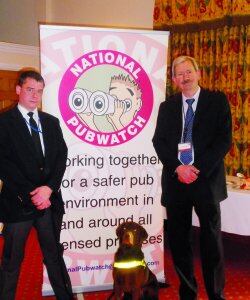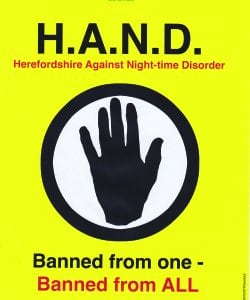Then, another group arrives. The more the merrier, you think, before realising that one of the group matches the photo of a local troublemaker that was handed to you at a meeting last week. You tell the guy he isn’t welcome, and his rowdy-looking bunch follow him out of the door.
Another potential flashpoint averted — and its all down to being part of a pubwatch.
In case you weren’t already aware, a pubwatch is, in effect, the licensed trade’s equivalent of Neighbourhood Watch. Where they differ, according to National Pubwatch (NPW) — the voluntary organisation that sup-ports local pubwatch schemes — is that pubwatches are more active and effective than most Neighbourhood Watch schemes.
So, what does a publican have to gain from forming or joining a pubwatch scheme? How do you go about setting one up? And what will ensure its success?
The first scheme that could loosely be regarded as a pubwatch is believed to have started 40 years ago, by the London Metropolitan Police. Given the resilience and development of pubwatch schemes over the past four decades, it’s easy to understand why a particular body would want to lay claim to being the first.
The establishment of NPW, meanwhile, grew out of a desire to support and protect those local schemes.
According to NPW chairman and former police officer Steve Baker, the overarching goal of NPW chimes with each and every pubwatch scheme across the UK.
“It’s about achieving a safe, secure and responsibly-led social drinking environment in all licensed premises,” he says.
“If it hadn’t been meeting the needs of the licensed trade, I don’t think NPW would have survived so long. So it obviously does meet a need, and it is obviously successful in reducing problems for members,” Baker adds.
Today, pubwatch schemes can range from city-based groups with more than 200 licensed premises, to small rural schemes involving as few as five premises.

And despite the name, it isn’t just pubs that get involved in pubwatch schemes. Many pubwatches include hotels, restaurants, clubs, bowling alleys and even late-night fast-food outlets and taxi ranks.
Taking action
The basic principle of a pubwatch is that licensees of the premises involved agree on a number of courses of action against individuals who cause or threaten damage, disorder, violence, use or deal drugs in their premises, or are a general nuisance.
This action normally consists of agreeing to refuse to serve individuals who cause, or are known to have previously caused, these sorts of problems. Having agreed these policies, the pubs involved in the pubwatch publicise them either in their premises or online through the websites of their own pubs or the pubwatch itself.
Indeed, an increasing number of pubwatches are now taking the digital approach as a means of keeping licensees constantly in the loop about the individuals banned from pubs in the area, as well as providing a forum to discuss key issues within the scheme.
Some schemes, such as the pubwatch in Bolton, have become digital-only, allowing licensees to remain free to meet the challenges of running their pub without the added economic burden of printing photos or travelling to other premises in their scheme.
Nevertheless, the pubwatch will still hold regular meetings as and when the need arises — for example, to discuss banning an individual from every premises participating in the scheme, or to work out a strategy on dealing with a particular issue in the area.
After all, there is more to a pubwatch scheme than merely banning people from licensed premises.
Steve Baker says a successful scheme enables licensees to work together to make sure that they are able to operate in a safe and secure environment, and keep their premises, and the streets outside, free from alcohol-related crime and disorder.
As part of the Licensing Act 2003 (implemented in November 2005), some licensing authorities obtained conditions for licences in their area that required all premises to be members of the local pubwatch.
This situation is rare, however, and the majority of pubwatches continue to pride themselves on their voluntary nature, with licensees becoming members as and when they wish.
Those licensees who initially do not want to join almost inevitably end up hosting individuals banned from other premises and often, as a result, end up becoming a pubwatch member.
Getting started
Therefore, it is reasonably safe to assume pubs are generally better off in a pubwatch scheme than out of it. But if there isn’t one in your area, how do you go about setting one up?
The first step to starting a pubwatch scheme is to enlist the support of your local police officer or police/local authority licensing officer and other like-minded licensees.
It is then a case of setting up an inaugural meeting with local licence holders to explain the benefits of the scheme. After proposing the formation of the watch, licensees should refer to the NPW’s good practice booklet for guidance on what to consider, including their scheme’s constitution and rules.

The key to securing the successful launch of a pubwatch scheme is an acceptance by all members that they abide by the decisions of the pubwatch, as it is the unity of action that makes the watch effective.
NPW can support new schemes by providing free posters and window- stickers, and will often arrange for a member of its committee to attend inaugural meetings.
It’s also a first port of call for advice.
When it comes to funding, Baker believes a traditional pubwatch scheme should be very low cost if it is run voluntarily by the members.
“However, the membership can raise money quite easily through subscriptions or running fundraising events,” Baker suggests.
“If the scheme wants to run its own specific initiatives, it may need to seek funding and I would think that most schemes will have contacts either with suppliers or large companies, who might be willing to offer assistance,” he adds.
Close inspection
Once your pubwatch is set up, you need to monitor its effectiveness constantly — and part of that effectiveness is to prove how beneficial it is to the outside world. Of course, each and every scheme has its own unique issues related to crime and disorder, and as such, success will vary accordingly.
“You have to start thinking about how you might measure your activities, so that people outside can understand what you are achieving,” says Baker. “It’s about showing how it benefits the wider community and reduces crime in town centres.”
NPW advises the best way for pubwatch schemes to measure success is to enter a community safety partnership with the police. Licensees can ask the police for a baseline measurement of what crime was like before a scheme was set up, and request that they measure this year by year.
Although this may depend on what police record as a crime, they should be able to map where crime is happening over a 12-month period.
Challenges
It all sounds rather plain sailing so far, but it’s wise to remember pubwatches aren’t without their challenges. As pubwatch schemes are not defined as public bodies in the same way that, for example, a local police-force would be, they are not subject to human rights legislation.
This gives them total discretion over banning certain individuals from licensed premises. However, those individuals banned will often challenge their ban on human rights grounds by claiming that local authorities are involved in the management or decision-making process of the scheme.
This can, in some instances, lead to a judicial review of the ban. In 2010 a local businessman was able to force a review of his ban by Haverhill Pubwatch, claiming that police and local authority involvement meant the scheme had a public function and should be subject to extra scrutiny.

And even though the Haverhill Pubwatch ban was upheld, the case highlights the pitfalls of any further public-body intervention, namely the single accreditation scheme for local business partnerships proposed by the Association of Chief Police Officers (ACPO) last year.
“This is why a pubwatch scheme needs to be run by its members,” says Steve Baker. “While some pubwatch schemes exist quite happily either alongside or within business partnerships, a bureaucratic and costly centralised system will impact on the effectiveness of local licensees to manage their own problems in the way they see fit. “
Despite these concerns, Baker is confident about the future of the schemes and the good they do for wider society. “From the bottom up, this is all about local pubs working together, because they feel there is a need for it,” he says. “I think that is the most powerful point about pubwatch. It is their scheme — it is the pubs’ scheme.”
Sandwell Pubwatch, West Midlands
Stephanie Cox, from Sandwell Pubwatch, says one of the main benefits of the scheme is that she gets to meet the other licensees in the area. “You may know the pub down the road, but you might not know the person who runs it,” she suggests.
Sandwell claims to be the first pubwatch to have linked up via the internet. But face-to-face meetings – where Cox gets to find out “who the idiots are” in the area – are still important.
“If there’s somebody you’re not sure about, they can tell you if it is an idiot you should be wary of, or a good person who is just having a bad night,” she adds.
At the meetings Cox also gets to meet local licensing officers, who provide information on what has been going on in the area over the past month.
“If there’s a spate of car thieving or a drugs issue, they will have that information. And if you have got any questions about something around your pub or your area that you want clarification on, they might have the answers,” Cox explains.
“Pubwatch is what the licensees make of it. It can be a valuable tool.”
Herefordshire Against Night-time Disorder (HAND)

Licensee Paul Neades and PC Steve Thomas of West Mercia police set up HAND in 2004 to take direct action against anyone getting involved in alcohol-related disorder, either in pubs and clubs or outside on the streets.
The close partnership between the licensees and the police ensures that anyone banned from one participating business will automatically be banned from all those that are signed up to HAND.
The scheme has been a great success in deterring troublemakers and there are now 50 participating premises in Hereford alone. The scheme also successfully operates in Leominster, Kington, Ledbury, Bromyard and Ross-on-Wye.
“We invited agencies to talk to licensees and we also get requests from agencies to speak,” says Neades.
“For example, we have just had a Rape & Alcohol Crisis centre open in Hereford, which informed licensees of its service and asked if we could help spread the word.
“In addition, we have visits from people such as Validate to help us keep up-to-date on the latest forms of ID that are being presented. They also support us with ID-card material,” he adds.
“I think the longevity of the scheme speaks for itself and the rollout of the model is our most successful outcome,” Neades concludes.
Top tips for an effective pubwatch
- Meet regularly.
- Keep the meeting informative.
- Let everyone have their say.
- Keep everyone updated on the latest information and the next meeting dates by email.
- Ensure all members are honouring the scheme and address non-compliance.
- Invite partner agencies and accept requests for people to attend.
- Keep banning lengths fair and relevant and don’t be afraid to ban anyone you feel causes disorder.
- Run the scheme independently and do not let police or local council impact on decisions related to banning.
- Make sure that banning letters are sent out immediately and photos/names are issued.
- Record and log all breaches so that offenders’ bans can be extended to keep the scheme credible.
